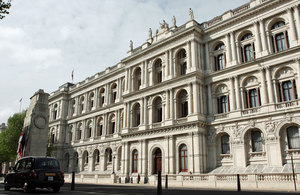Identity and Language (NI) Bill: Second Reading Opening Speech
My Lords, I apologise at the outset if my voice is a little croakier than normal: it is entirely down, I think, to four days of singing “God Save the Queen”.
Before turning to the Bill, I would like to make two brief observations. First, I associate myself and the Government with the outrage and abhorrence expressed throughout Northern Ireland in recent days at the vile videos circulating regarding the tragic killing of Michaela McAreavey in 2011. The actions of those responsible are contemptible beyond words; they are in no way representative of unionism or loyalism, and our thoughts are very much with the McAreavey and Harte families at this very difficult time.
Secondly, and on a more positive note, Northern Ireland, like the rest of the United Kingdom, has just spent four days celebrating the glorious reign, devotion to duty, integrity and selfless leadership of Her Majesty the Queen.
I would like to thank all those responsible for planning events and activities that I know were enjoyed right across the community. The fact that I had messages at the weekend from people of a nationalist background expressing their admiration for the Queen is testimony to Her Majesty’s unique ability to unite people and bring them together.
The context of the Bill before the House this afternoon is the collapse of devolved government from 2017 to 2020 and the intensive efforts over almost three years to restore it. Although issues around language and identity were not the prime reason for the collapse in January 2017, during the subsequent Assembly election and beyond the capacity of these issues to poison debate and paralyse politics in Northern Ireland became all too apparent.
It quickly became clear that without substantial progress on them, there was little prospect of seeing a return of the institutions that are such an integral part of the Belfast agreement that we in this Government staunchly support and uphold.
I will not detain the House with the details of the multiple phases of talks that took place during those three years. As one who played a role in the majority of them as a government adviser, I can say that it was a deeply frustrating experience that I do not look back on with any affection. It was proof, if any were needed, that it is far easier to pull down the institutions in Northern Ireland than it is to build them.
Eventually, following the 2019 general election, in January 2020 the UK and Irish Governments were able to present the document New Decade, New Approach to the main Northern Ireland parties as the basis for reforming the Executive, which duly happened.
Of course, integral to New Decade, New Approach were commitments, principally though not exclusively in Annexe E, on identity and language, based on the discussions of the previous three years.
Crucially, the document contained a commitment in part 2, paragraph 25 to “respect the freedom of all persons in Northern Ireland to choose, affirm, maintain and develop their national and cultural identity and to celebrate and express that identity in a manner which takes into account the sensitivities of those with different national or cultural identities and respects the rule of law.”
As set out in New Decade, New Approach, the provisions on identity and language were to be taken forward by the restored Executive through three separate pieces of legislation, the main contents of which were published in Annexe E and in the three draft Bills prepared by the Office of the Legislative Counsel in Northern Ireland at the request of the UK Government, to support a successful conclusion to the ongoing political talks to restore the Executive.
Once passed, these Acts would then become new, dedicated parts of the Northern Ireland Act 1998, reflecting the importance and significance of these issues to many people right across society.
It was always the Government’s intention and very clear preference that these provisions would be delivered by the Northern Ireland Executive and Assembly, as they are devolved matters.
Regrettably, however, by the autumn of last year it became clear that this was unlikely to happen any time soon, and my right honourable friend the Secretary of State for Northern Ireland decided to take these matters forward in this sovereign Parliament of the United Kingdom. The Bill before the House today honours that commitment.
It represents a balanced package of measures that faithfully implements in one piece of legislation Annexe E of New Decade, New Approach, recognises Northern Ireland’s rich diversity of identity and language, and benefits both Irish language speakers and those from the Ulster Scots and Ulster British tradition.
It comes in addition to a number of other steps being taken by the UK Government under New Decade, New Approach, as set out in the annexe on UK Government commitments to Northern Ireland.
Last year, therefore, we announced £2 million in funding for Northern Ireland Screen’s Ulster Scots and Irish language broadcasting funds to help deliver more high-quality Irish and Ulster Scots broadcasting in Northern Ireland. In May of this year, the Government officially recognised Ulster Scots as a national minority under the Council of Europe’s Framework Convention for the Protection of National Minorities.
At the same time, under the section of New Decade, New Approach titled, “Addressing Northern Ireland’s unique circumstances”, we made available £4 million to the Irish Language Investment Fund to support capital projects associated with the Irish language.
Turning to the Bill, Clause 1 amends the Northern Ireland Act 1998 to make provision for national and cultural identity principles and requires specific public authorities to have due regard to them when carrying out their functions. To summarise, these principles affirm the freedom of everybody in Northern Ireland to choose, affirm, maintain and develop their national and cultural identity within the law.
They establish the important role of public authorities in promoting reconciliation, tolerance and parity of esteem. The clause also establishes a new office of identity and cultural expression to promote awareness and to monitor and encourage compliance with the principles outlined above.
It will be a statutory body and its director will be appointed by the First and Deputy First Ministers of Northern Ireland, acting jointly. It will be able to provide funding to groups and organisations in support of the cultural and linguistic heritage of Northern Ireland.
Clause 2 amends the Northern Ireland Act to make provision for the official recognition of the status of the Irish language and the appointment of an Irish language commissioner to enhance and protect its use by public authorities when they are providing services.
The commissioner, who will be appointed by the First and Deputy First Ministers, acting jointly, will develop standards of best practice to which public authorities must have due regard. These standards, intended to be “reasonable, proportionate and practical”, will have to be approved by the First and Deputy First Ministers before they can take effect.
The commissioner will also monitor and promote compliance with approved standards and investigate complaints where it is claimed that a public authority has failed to comply with its obligations.
Clause 3 makes provision for the appointment of a commissioner for the enhancement and development of the language, arts and literature associated with the Ulster Scots and Ulster British tradition. They will, for example, promote awareness of Ulster Scots services provided by public authorities and provide and publish advice, support and guidance in respect of language, arts and literature.
Reflecting the Government’s recent recognition of Ulster Scots under the framework convention, this advice will also cover the effect and implementation of certain named international instruments. The commissioner will also be required to investigate complaints that a public authority did not have due regard to guidance relating to facilitating the use of Ulster Scots in the provision of services to the public.
The Government are of course mindful of the potential impacts of these three new public authorities on Northern Ireland’s carefully balanced constitutional framework, including the north-south language body and human rights institutions. For that reason, all three new public authorities will be able to co-operate with and, as they deem fit, consult the various language bodies and human rights institutions in Northern Ireland as they go about their work, such as the Ulster-Scots Agency and Foras na Gaeilge, which I met in Belfast last week.
This reflects the vision set out in New Decade, New Approach Clause 4 will repeal the Administration of Justice (Language) Act (Ireland) 1737 so that provision for the use of languages other than English in proceedings will be a matter for the Northern Ireland Courts Service to determine as and when it deems necessary.
I should point out to those who might still be concerned about this that the equivalent legislation for England and Wales was repealed by Lord Palmerston in 1863.
Clause 5 amends the Education (Northern Ireland) Order 1998 to place a duty on the Department of Education in Northern Ireland to encourage and facilitate the use and understanding of Ulster Scots in the education system. Clauses 6 and 7 contain important concurrent powers and powers of direction for the Secretary of State to ensure the implementation of the commitments in this Bill. Finally, the remaining Clauses 7 to 11 deal with consequential and general provisions.
The Bill is an important milestone in the delivery of New Decade, New Approach, which was so instrumental to the restoration of devolved government in January 2020. It takes forward commitments on identity and language for the whole community in Northern Ireland. In doing so, this Government recognises the rich tapestry of identities, languages and culture which enhance, enrich and strengthen, rather than weaken, our United Kingdom.
This legislation complements and underpins this Government’s vision of a Northern Ireland which is open, inclusive and tolerant and embraces people from all parts of the community regardless of their religious belief, political opinion or racial group.
This Government are and will remain steadfast in their belief in the union and Northern Ireland’s integral place within it, but recognise that, if the union is to prosper and endure, it must work for everyone. I believe that this carefully balanced piece of legislation achieves just that. In that spirit, I commend it to the House.
As they say in Irish, sin é. I beg to move.


